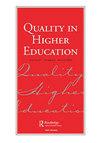企业管治和机构对认证标准变化的反应能力
IF 1.5
Q3 EDUCATION & EDUCATIONAL RESEARCH
引用次数: 4
摘要
认证是教育部门及其质量保证体系的主要支柱。本文的目的是研究公司管治如何影响公私营机构对采用新认证标准的反应。这项调查对意大利伦巴第大区500多家职业教育和培训机构进行了抽样调查。结果表明,供应商对新认证标准的适应反应确实取决于公司治理因素。其中,影响最大的因素是监事会的职能和组成。最后,这项工作涉及认证标准的创新:对反腐败法的响应和遵守程度的新评级措施。本文章由计算机程序翻译,如有差异,请以英文原文为准。
Corporate governance and the responsiveness of organisations to a change in accreditation standards
ABSTRACT Accreditation is a main pillar for the educational sector and its quality assurance system. The aim of this article is to study how corporate governance affects the responsiveness of public and private organisations to adopting new accreditation standards. The survey was conducted on a sample of more than 500 vocational education and training providers in the Lombardy Region of Italy. The results show that the responsiveness of the providers to the adaptation of new accreditation standards does depend on corporate governance factors. In particular, the most influential factors are the functioning and composition of the supervisory board. Finally, this work deals with an innovation in accreditation standards: a new rating measure of the level of responsiveness and compliance with anticorruption law.
求助全文
通过发布文献求助,成功后即可免费获取论文全文。
去求助
来源期刊

Quality in Higher Education
EDUCATION & EDUCATIONAL RESEARCH-
CiteScore
3.30
自引率
14.30%
发文量
32
期刊介绍:
Quality in Higher Education is aimed at those interested in the theory, practice and policies relating to the control, management and improvement of quality in higher education. The journal is receptive to critical, phenomenological as well as positivistic studies. The journal would like to publish more studies that use hermeneutic, semiotic, ethnographic or dialectical research as well as the more traditional studies based on quantitative surveys and in-depth interviews and focus groups. Papers that have empirical research content are particularly welcome. The editor especially wishes to encourage papers on: reported research results, especially where these assess the impact of quality assurance systems, procedures and methodologies; theoretical analyses of quality and quality initiatives in higher education; comparative evaluation and international aspects of practice and policy with a view to identifying transportable methods, systems and good practice; quality assurance and standards monitoring of transnational higher education; the nature and impact and student feedback; improvements in learning and teaching that impact on quality and standards; links between quality assurance and employability; evaluations of the impact of quality procedures at national level, backed up by research evidence.
 求助内容:
求助内容: 应助结果提醒方式:
应助结果提醒方式:


